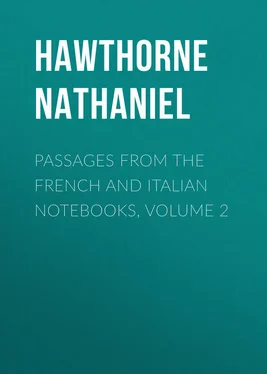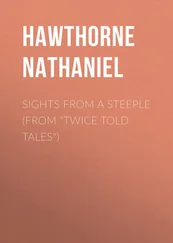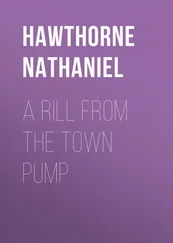Nathaniel Hawthorne - Passages from the French and Italian Notebooks, Volume 2
Здесь есть возможность читать онлайн «Nathaniel Hawthorne - Passages from the French and Italian Notebooks, Volume 2» — ознакомительный отрывок электронной книги совершенно бесплатно, а после прочтения отрывка купить полную версию. В некоторых случаях можно слушать аудио, скачать через торрент в формате fb2 и присутствует краткое содержание. Жанр: literature_19, foreign_antique, foreign_prose, на английском языке. Описание произведения, (предисловие) а так же отзывы посетителей доступны на портале библиотеки ЛибКат.
- Название:Passages from the French and Italian Notebooks, Volume 2
- Автор:
- Жанр:
- Год:неизвестен
- ISBN:нет данных
- Рейтинг книги:3 / 5. Голосов: 1
-
Избранное:Добавить в избранное
- Отзывы:
-
Ваша оценка:
- 60
- 1
- 2
- 3
- 4
- 5
Passages from the French and Italian Notebooks, Volume 2: краткое содержание, описание и аннотация
Предлагаем к чтению аннотацию, описание, краткое содержание или предисловие (зависит от того, что написал сам автор книги «Passages from the French and Italian Notebooks, Volume 2»). Если вы не нашли необходимую информацию о книге — напишите в комментариях, мы постараемся отыскать её.
Passages from the French and Italian Notebooks, Volume 2 — читать онлайн ознакомительный отрывок
Ниже представлен текст книги, разбитый по страницам. Система сохранения места последней прочитанной страницы, позволяет с удобством читать онлайн бесплатно книгу «Passages from the French and Italian Notebooks, Volume 2», без необходимости каждый раз заново искать на чём Вы остановились. Поставьте закладку, и сможете в любой момент перейти на страницу, на которой закончили чтение.
Интервал:
Закладка:
She has suffered terribly by the mishaps of her long existence in the marble. Each of her legs has been broken into two or three fragments, her arms have been severed, her body has been broken quite across at the waist, her head has been snapped off at the neck. Furthermore, there have been grievous wounds and losses of substance in various tender parts of her person. But on account of the skill with which the statue has been restored, and also because the idea is perfect and indestructible, all these injuries do not in the least impair the effect, even when you see where the dissevered fragments have been reunited. She is just as whole as when she left the hands of the sculptor. I am glad to have seen this Venus, and to have found her so tender and so chaste. On the wall of the room, and to be taken in at the same glance, is a painted Venus by Titian, reclining on a couch, naked and lustful.
The room of the Venus seems to be the treasure-place of the whole Uffizi Palace, containing more pictures by famous masters than are to be found in all the rest of the gallery. There were several by Raphael, and the room was crowded with the easels of artists. I did not look half enough at anything, but merely took a preliminary taste, as a prophecy of enjoyment to come.
As we were at dinner to-day, at half past three, there was a ring at the door, and a minute after our servant brought a card. It was Mr. Robert Browning's, and on it was written in pencil an invitation for us to go to see them this evening. He had left the card and gone away; but very soon the bell rang again, and he had come back, having forgotten to give his address. This time he came in; and he shook hands with all of us, children and grown people, and was very vivacious and agreeable. He looked younger and even handsomer than when I saw him in London, two years ago, and his gray hairs seemed fewer than those that had then strayed into his youthful head. He talked a wonderful quantity in a little time, and told us – among other things that we should never have dreamed of – that Italian people will not cheat you, if you construe them generously, and put them upon their honor.
Mr. Browning was very kind and warm in his expressions of pleasure at seeing us; and, on our part, we were all very glad to meet him. He must be an exceedingly likable man… They are to leave Florence very soon, and are going to Normandy, I think he said, for the rest of the summer.
The Venus de' Medici has a dimple in her chin.
June 9th. – We went last evening, at eight o'clock, to see the Brownings; and, after some search and inquiry, we found the Casa Guidi, which is a palace in a street not very far from our own. It being dusk, I could not see the exterior, which, if I remember, Browning has celebrated in song; at all events, Mrs. Browning has called one of her poems "Casa Guidi Windows."
The street is a narrow one; but on entering the palace, we found a spacious staircase and ample accommodations of vestibule and hall, the latter opening on a balcony, where we could hear the chanting of priests in a church close by. Browning told us that this was the first church where an oratorio had ever been performed. He came into the anteroom to greet us, as did his little boy, Robert, whom they call Pennini for fondness. The latter cognomen is a diminutive of Apennino, which was bestowed upon him at his first advent into the world because he was so very small, there being a statue in Florence of colossal size called Apennino. I never saw such a boy as this before; so slender, fragile, and spirit-like, – not as if he were actually in ill health, but as if he had little or nothing to do with human flesh and blood. His face is very pretty and most intelligent, and exceedingly like his mother's. He is nine years old, and seems at once less childlike and less manly than would befit that age. I should not quite like to be the father of such a boy, and should fear to stake so much interest and affection on him as he cannot fail to inspire. I wonder what is to become of him, – whether he will ever grow to be a man, – whether it is desirable that he should. His parents ought to turn their whole attention to making him robust and earthly, and to giving him a thicker scabbard to sheathe his spirit in. He was born in Florence, and prides himself on being a Florentine, and is indeed as un-English a production as if he were native of another planet.
Mrs. Browning met us at the door of the drawing-room, and greeted us most kindly, – a pale, small person, scarcely embodied at all; at any rate, only substantial enough to put forth her slender fingers to be grasped, and to speak with a shrill, yet sweet, tenuity of voice. Really, I do not see how Mr. Browning can suppose that he has an earthly wife any more than an earthly child; both are of the elfin race, and will flit away from him some day when he least thinks of it. She is a good and kind fairy, however, and sweetly disposed towards the human race, although only remotely akin to it. It is wonderful to see how small she is, how pale her cheek, how bright and dark her eyes. There is not such another figure in the world; and her black ringlets cluster down into her neck, and make her face look the whiter by their sable profusion. I could not form any judgment about her age; it may range anywhere within the limits of human life or elfin life. When I met her in London at Lord Houghton's breakfast-table, she did not impress me so singularly; for the morning light is more prosaic than the dim illumination of their great tapestried drawing-room; and besides, sitting next to her, she did not have occasion to raise her voice in speaking, and I was not sensible what a slender voice she has. It is marvellous to me how so extraordinary, so acute, so sensitive a creature can impress us, as she does, with the certainty of her benevolence. It seems to me there were a million chances to one that she would have been a miracle of acidity and bitterness.
We were not the only guests. Mr. and Mrs. E – , Americans, recently from the East, and on intimate terms with the Brownings, arrived after us; also Miss F. H – , an English literary lady, whom I have met several times in Liverpool; and lastly came the white head and palmer-like beard of Mr. – with his daughter. Mr. Browning was very efficient in keeping up conversation with everybody, and seemed to be in all parts of the room and in every group at the same moment; a most vivid and quick-thoughted person, logical and common-sensible, as, I presume, poets generally are in their daily talk.
Читать дальшеИнтервал:
Закладка:
Похожие книги на «Passages from the French and Italian Notebooks, Volume 2»
Представляем Вашему вниманию похожие книги на «Passages from the French and Italian Notebooks, Volume 2» списком для выбора. Мы отобрали схожую по названию и смыслу литературу в надежде предоставить читателям больше вариантов отыскать новые, интересные, ещё непрочитанные произведения.
Обсуждение, отзывы о книге «Passages from the French and Italian Notebooks, Volume 2» и просто собственные мнения читателей. Оставьте ваши комментарии, напишите, что Вы думаете о произведении, его смысле или главных героях. Укажите что конкретно понравилось, а что нет, и почему Вы так считаете.












